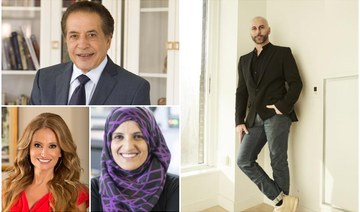CHICAGO: Some of the Arab-American community’s leading social media influencers shared the strategies they use to build millions of followers during a panel discussion hosted Thursday by the Arab America Foundation.
The panelists said they strived to be authentic and blend humor and honesty into their content.
Chicago food blogger Mai Kakish, who posts at www.AlmondAndFig.com, said she put her recipes into the context of Palestinian culture, everyday life in the US and in occupied Palestine.
“I try to tell how much Palestinian food holds a special place in my Palestinian identity and share that,” Kakish said. “I want to take people not just for the recipes (because) our cuisine is often over-simplified in this industry. It’s never labeled as Palestinian cuisine. I started realizing people love our food. I use Palestinian food as a reflection of the fabric of our life.”
Her posts transported readers to a place they had never been, she added.
“I want to transport them to that place where my grandfather and grandmother were from,” said Kakish, whose grandparents still live in Israeli-occupied Palestine. “People talk about our food all the time, but they don’t talk about the back stories, which is often misunderstood.”
Salem Furrha and his eight children turned to social media as a means of breaking up the boredom of coronavirus restrictions. The family account on Tiktok quickly attracted millions of followers.

“We got into social media because of COVID,” said Furrha. “We started doing family skits that were fun. We got joy out of seeing people laugh. It was really a good feeling and we decided to continue it.”
The @theFurrhaFamily account has 3.2 million followers and 95 million likes.
Furrha said people recognized him in stores even though he wore a face mask, asking him: “Aren’t you the guy on TikTok?”
Faiza Rammuny used her presence on YouTube, Instragram and TikTok as a relationship adviser for Muslim and Arab clients. She started her platform, www.ExpiredNFabulous.com, in 2015 on Instagram sharing her stories “and the stories of others who were voiceless.”
She described her 370,000 Instagram and 400,000 TikTok followers as “a tribe of misfits.”
“I use my platform to give a voice to people who don’t have one, who can’t speak up because of their family cultural restrictions, or because of where they come from in the community or society. The platform gives them the ability to showcase or I share their stories,” Rammuny said. “We are human beings. We have to show our vulnerabilities and put the human aspect of what it means to be an Arab out there and I feel my work does that.”
Syrian-Canadian influencer Saif Shawaf became popular when he posted the “The Chicken Wing Arab Zaffe” song.
It features the lyrics “Chicken wing, chicken wing. Hot dog and bologna. Chicken and macaroni. Chilling with the homies” and is sung to a Palestinian tablah beat. The video shows him and his friends with black and white Palestinian keffiyehs draped over their shoulders.
Shawaf acknowledged that, while the song may sound silly, it had brought a lot of attention to his stories about Arab culture and life. Saif has more than 2.3 million followers and more than 46 million TikTok views under the handle @SaifShawaf.
“I want to show people what being an Arab really is,” said Shawaf, who was born in Saudi Arabia and lived in Dubai before settling in Canada.
The panel discussion was moderated by Shereen Ahmed, an Egyptian singer and actress who is currently starring as Eliza Doolittle in a production of “My Fair Lady.”
The panelists said their social media following generated income from sponsors seeking to use their platforms for product promotion.






























